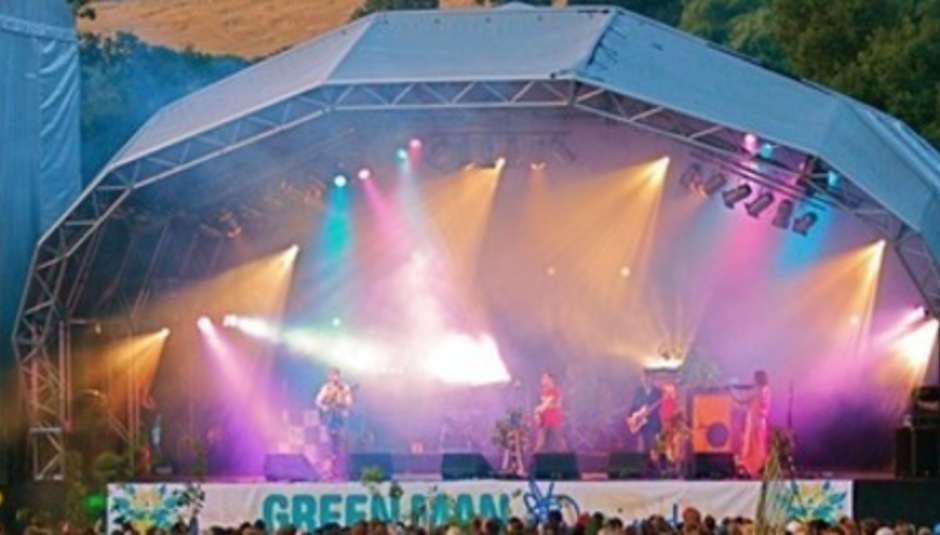DiS is interviewing the chief booker of Green Man festival Ben Coleman amidst the backdrop of a somewhat disillusioning few days for the UK festival scene. First ATP announced (or didn’t announce) a major company re-shuffle, whilst the BLOC Weekender in London was shut down after just one evening. Ok, so the circumstances for each respective promoter’s strife were markedly different, but at a time following the washouts of Download and Isle of Wight - which themselves came on top of a host of other events announcing cancellations this year - festival promoters needed more bad press like the proverbial gap in the cranium.
However, whilst there's little point denying that times are tough for outdoor events at the moment, festivals like Green Man (and Latitude, where DiS recently had a great weekend) prove that it's still possible to thrive in a saturated market. Ultimately the success of Green Man - which has been running since 2003 and moved to its current location in 2005 - has endured because you get a sense that the organisers understand that, when all is said and done, it will be the quality of the event itself, and not the names of the people who put it on, that linger in the memory. The festival experience as a whole is constantly evolving, beyond just refreshing the line-up year-on-year.
DiS will be there again this year for the event which runs between August 17th to the 19th and will be providing a who-to-see preview nearer the time. In the meantime though Ben chatted to us about how Green Man’s managed to sustain itself over the years, and how he manages to fit all sides of the argument together when booking the bill.
DiS: Green Man itself has changed hugely since you joined the team seven years ago. Back then, did you envisage how far it would come?
BC: I think all we’ve ever wanted to do is to just build on the work that’s been done before. It was certainly the case when I joined; it already had a great reputation. Of course we did take it to a new site and I think there was a thought of some organic growth in our heads, but mainly we just wanted to keep it really lovely and provide both great music and an overall experience that people could come and enjoy. I don’t know that we knew it would take off but then it’s a fair bit bigger now than in 2005.
DiS: I went for the first time last year, but I went with some guys who’d been for the previous three or four years too, and they said that what’s great about it is that manages to change yet recognises that returning core audience. As a booker, how hard is it to balance that need to constantly refresh the type of line-up you put on whilst at the same time remembering the returning punter?
BC: You’ve just got to keep your ears open and listen really. We look at our forums because a lot of our longstanding audience are on there still and they’re constantly talking about what they’d like to see at Green Man; but then to keep the balance with that and the new festival goers we attract each year you of course have to look beyond that, especially as our demographic is getting wider. I’ve found that our older audience tend to be on the forums and the younger ones are on Facebook and Twitter so we’re keeping track of that too. Ultimately though it has to come from us, and I will always be looking out for bands I love and getting them on the bill; the trick is to match up the huge list of bands I have, and ones that repeatedly crop up in the forums and on social networking so that I can please everyone.
DiS: You’re talking about this mix of an older and younger demographic and, I guess, the selection of Van Morrison proves that you’re catering for that older audience. You also have Mogwai and Feist on Friday and Sunday – was there and is there a certain angle you go with when booking your headliners?
BC: For me festivals are about a mix of people. Growing up I went to loads; I went to Glastonbury when I was really young it was great being around people of all ages. Festivals are not just for one type of person, that’s the beauty of them. With Van Morrison I think there’s the chance of pleasing both that older a crowd and introducing him to a whole new audience - I’ve seen him at Glastonbury before where he’s done just that. With Feist it was as simple as we loved her brilliant album Metals from last year, and I think her set on the Sunday is set to be one of our best final night headliners that I can recall. Then Mogwai will just kick off the weekend perfectly with that loudness and intensity they bring, it’ll really get everybody going. Again, we wanted to cover all bases and reach out to everyone in attendance; I’d hope that someone could pick at least one of those headliners they’d want to go and see.
DiS: Looking further down the bill, how much do you strategise your time slots and how much has that model changed over the years?
BC: I’m a big fan of bills that crescendo, and to be honest with you it comes down to what I like to do at a festival, which is normally ambling around during the day – usually hungover! – then seeing something special that’ll get me on my feet just as the evening comes round. That sort of time’s a great time to introduce people to acts like Three Trapped Tigers, Savages and Toy, bands maybe a bit higher tempo than some of the afternoon stuff. It’s important to mix it up a bit on stages too though, I don’t think people come for just one type of music.
DiS: Green Man has always done really well at keeping to a relative niche and booking bills that ring true to its identity – even though that sometimes means not booking artists with perhaps a much bigger fan base – is there ever the temptation to blow out money on someone guaranteed to bring in the crowd even if it doesn’t fit quite with your taste?
BC: I am conscious about keeping to our identity. Green Man’s got a great thing going on and I wouldn’t want to stray too far from that. As long as the music’s great I think it’s a good fit for Green Man, that’s the sole premise. Of course, there is the worry that sometimes we’re booking stuff that is very niche, but I think you only need to look at the wider demographic of people we attract to see its working – I don’t think we’ll be booking Bruno Mars any time soon!
DiS: The wider situation regarding UK festivals is notably somewhat turbulent on the surface currently. We’ve seen ATP having trouble, there’ve been lists of festivals getting cancelled and others underselling. I don’t think it’s simply the festival market is failing, it’s clearly part of the wider economic situation; a recent piece in The Stool Pigeon showed just how differently various festival organisers viewed the current situation though, from optimistic to extremely negative, where do you guys stand in relation?
BC: We’re obviously very aware of other festivals and how they’re doing, and it is sad to hear of others. You mentioned ATP there; we’ve got so much love for those guys. It’s not clean cut though, festivals are not on the demise as a whole, they’re still selling out. Look at Secret Garden Party, Beautiful Days, Kendal Calling… so festivals are still doing a job. People just don’t have the expendable income that they had in previous years, the knock on from the economic downturn has hit festivals a couple of years later than other aspects of the UK because they are such a much-loved part of British culture! People have enjoyed partying in fields for a long time and that’s not going to just drop away, you just now need to make sure you up your game every year.
I would say for us too that we’ve never relied on sponsorship money, and I think a lot of festivals are seeing money they might’ve factored into budgets from sponsors now fading away. We’ve never factored that into our costings and so that’s always held us in a good position.
What I will say is though that for all the ones that do fold there seems to be the same amount popping up the next year. There’s no denying it is a really difficult year; people are talking about the Olympics and all the free events going on and the Jubilee and so on – and yeah they might be having an effect. Speaking for us though, we’re fine, our tickets are selling well, and I’m sure that next year there’ll be other events joining us, they’re not just going to fall off the edge of the market.
DiS: Maybe a streamlining of the UK’s festivals isn’t such a bad thing; it’s only relatively recently become such a phenomenon and for every festival like yourself or Secret Garden Party there’s another ten with the same line-ups as each other looking for a quick buck. Ultimately it’s the quality event which should be remembered surely as priority over the people putting it on?
BC: Shake up in anything is sometimes a good thing. I think the strong ones and maybe the ones with the most imagination will be who come through in the end. It’s a lovely industry to be involved in and it’s so rewarding to see an event you’ve worked on all year round come to fruition – it’s something that I can totally understand people wanting to get involved in. But it’s easy to start, it’s difficult to maintain it.
DiS: Putting the emphasis back on this year’s Green Man, what changes, if any, have you made?
BC: In general we were really happy with the festival last year, we made a lot of changes then. We’re always striving to make the site as accessible as possible and to keep it interesting we added ever more routes to navigate the site in. We moved the Far Out Stage last year, and this year we’re going to make the kids bit Einstein’s Garden better.
DiS: Einstein’s Garden blew me away last year; so many festivals advertise being family-friendly but that section of the site signified a real commitment to that.
BC: Like I say, our love of festivals comes from the diversity of people who come together for one. We’re lucky enough that we’re actually in the position where we’re pretty happy to carry on as we’ve been doing. I guess another big thing we’ve developed has been putting stuff on Thursday nights, which we started with Leonard Cohen premiering Bird On The Wire in 2010. Last year we had Tim Minchin play and that was probably the busiest I’d ever seen the Far Out Stage. This year we’ve got Bug with Adam Buxton and we’ve decided to plan some bands around that. Two thirds of our crowd now turn up on the Thursday so it’s good to give them something to do on that night. But yeah, out of all of the years this one is where we feel we’re not at the stage of just fine tuning and tweaking what we already do well.
DiS: You’re obviously very set on the sort of identity you want for Green Man now, when you started out though did you have other festivals that you took influence from?
BC: I’ve mentioned Glastonbury already - we all know about it and it’s amazing. What ATP has done too has been amazing and they’ve been somebody to admire and look up to. It is about being as unique as possible of course. Elsewhere though I’ve worked on the Big Chill in the past and some of the electronic influence on our line-up has probably come from there, such as last year’s late night Warp takeover.
DiS: That was incredible, though not so much for my Sunday.
BC: Ha, yeah I think the next day was difficult for a lot of people! This year we’ve got R+S Records doing a similar take over on the Saturday night.
DiS: The After Hours line-up has been another part of the festival that you’ve really sought to expand upon in recent years. When you started including it how careful did you have to be? It obviously has the potential to change the type of audience you attract quite drastically.
BC: There’s always been a heritage of dance music here; it goes back to the idea a crescendo of a line-up for me. You can listen to something light and enjoy it during the day, but then you want to have a bit of a boogie in the evening or listen to something completely different. But you are right, I’m very careful about what I put on in there. We just have to try and keep it interesting but stay aware of everyone at the festival. I mean, on that stage at night we’ve had Totally Enormous Extinct Dinosaurs and DJ Yoda, but then we’ve had Beyond The Wizard Sleeve and Hawkwind in there too! We’re very fortunate to have a crowd that can appreciate that diversity, and we’re very conscious about that when booking.
DiS: Finally, what would you say were a few of your personal highlights from your time booking Green Man?
BC: Caribou a few years back when he was still called Manitoba, definitely, it was after that set we thought we should rename the Folkie Dokie Tent to the Far Out Stage! British Sea Power playing Man of Aran in our cinema tent in 2009 was incredible and a performance people on our forum still talk about fondly. Beirut were brilliant in 2010 on the main stage; we’d booked and announced them in 2008 only for them to pull out so to get them there finally was just very special for us. The whole team were watching them - in a tiny bit of Welsh drizzle - and it was just a great moment.
We asked Ben to pick a few acts on the bill this year that might not be quite as well-known as some of the names on the main stage, but who he felt would make a name for themselves.
Withered Hand
“He’s a Scottish artist on Fence Records. He opens the Far Out Stage on the Saturday, he makes great music that manages to retain a really good sense of humour.”
The Staves
“Bon Iver has them supporting him on a tour in America soon, definitely not ones to miss.”
Greta Isaac
“Greta’s plays on the Friday on the walled garden stage. She’s only 17, local Welsh artist, and she jut has this most amazing voice.”
Green Man festival takes place August 17th - 19th 2012.






















